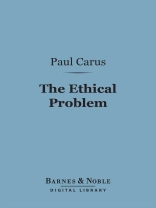Interested in the idea that good cannot be defined without a presupposed a world view, the pioneering religious scholar considers “Ethics, a Science, ” “The Data of Ethics, ” and “The Theories of Ethics” in this 1910 work. Includes discussions by distinguished contemporaries such as William L. Salter, John Maddock, F. M. Holland, and others, with replies by the author.
关于作者
Paul Carus (1852-1919) was a German-American author, philosopher, theologian, and editor. Brought up in an orthodox Protestant family, Carus developed liberal ideas which prompted him to move away from home to America. He edited several journals promoting free thought, then went on to write books, as well as correspond with figures such as Tolstoy, Edison, and Booker T. Washington. He pioneered interfaith dialogue, as well as created his own concept of religion, called the Religion of Science. He wrote The Soul of Man (1891), The Gospel of Buddha (1894), Nietzsche and Other Exponents of Individualism (1914), among many others.












